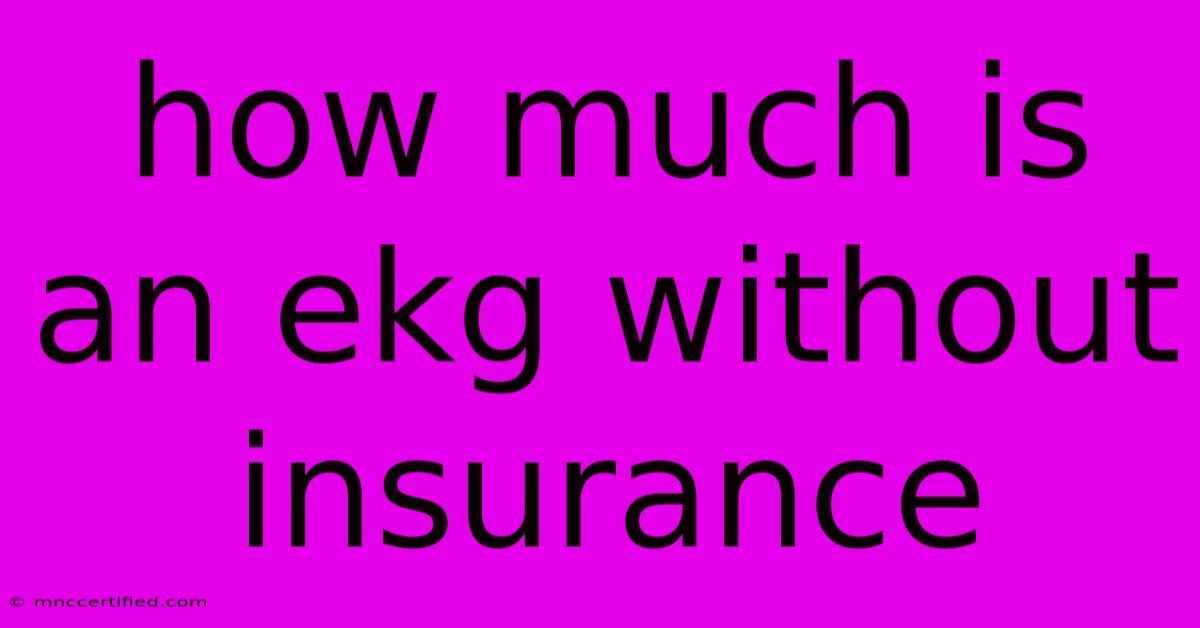How Much Is An Ekg Without Insurance

Table of Contents
How Much Does an EKG Cost Without Insurance?
An electrocardiogram (EKG or ECG) is a common medical test that records the electrical activity of your heart. It's often used to diagnose heart conditions, monitor heart health, and evaluate the effectiveness of treatment. But how much does an EKG cost without insurance?
The Cost of an EKG Without Insurance
Unfortunately, there's no one-size-fits-all answer to this question. The cost of an EKG can vary significantly depending on several factors:
- Location: Costs can differ significantly based on your geographic location. Urban areas tend to have higher costs compared to rural areas.
- Facility: The type of healthcare facility where the EKG is performed (hospital, clinic, doctor's office) can impact pricing.
- Type of EKG: Basic EKGs are generally less expensive than more specialized types, like a Holter monitor or stress test.
- Additional Services: If the EKG is part of a larger medical evaluation, the overall cost may be higher.
Typical Ranges
While the price can vary widely, here's a general idea of what you might expect to pay for an EKG without insurance:
- Basic EKG: $50 - $200
- Holter Monitor: $200 - $500
- Stress Test: $300 - $800
Tips for Saving Money
- Check for Discounts: Many healthcare providers offer discounts for self-pay patients or have payment plans available.
- Shop Around: Get quotes from multiple providers to compare prices.
- Ask About Free or Reduced-Cost Services: Some clinics or community health centers offer free or reduced-cost EKGs for low-income individuals.
- Consider a Mobile EKG: Mobile EKG services can often provide lower costs compared to traditional facilities.
Alternatives to Traditional EKGs
There are some newer technologies that offer alternative ways to monitor your heart health:
- Wearable Health Trackers: Devices like smartwatches and fitness trackers can provide basic heart rate information, but they are not substitutes for a medical EKG.
- At-Home EKG Devices: These devices are available for purchase online or at some pharmacies and allow you to perform an EKG at home. However, it's crucial to consult with a doctor for proper interpretation of the results.
Important Note: It's essential to prioritize your health and consult with a healthcare professional if you have concerns about your heart health. While finding affordable options is important, don't compromise your well-being by delaying necessary medical care.
Conclusion
The cost of an EKG without insurance can vary significantly, but understanding the factors that influence pricing can help you find the most affordable option. Remember to shop around, ask about discounts, and explore alternative testing methods if traditional EKGs are too expensive. Always prioritize your health and consult with a healthcare professional for any heart-related concerns.

Thank you for visiting our website wich cover about How Much Is An Ekg Without Insurance. We hope the information provided has been useful to you. Feel free to contact us if you have any questions or need further assistance. See you next time and dont miss to bookmark.
Featured Posts
-
Sc Braga Vs Sporting Lisbon Tv And Stream
Nov 11, 2024
-
Chemistry Chapter 6 Chemical Bonding
Nov 11, 2024
-
Wsl Chelsea Wins Big Keeps Pace With Leaders
Nov 11, 2024
-
Patrick Mahomes Motivates Kc Fans For Game
Nov 11, 2024
-
Big Name In Insurance Crossword Clue
Nov 11, 2024